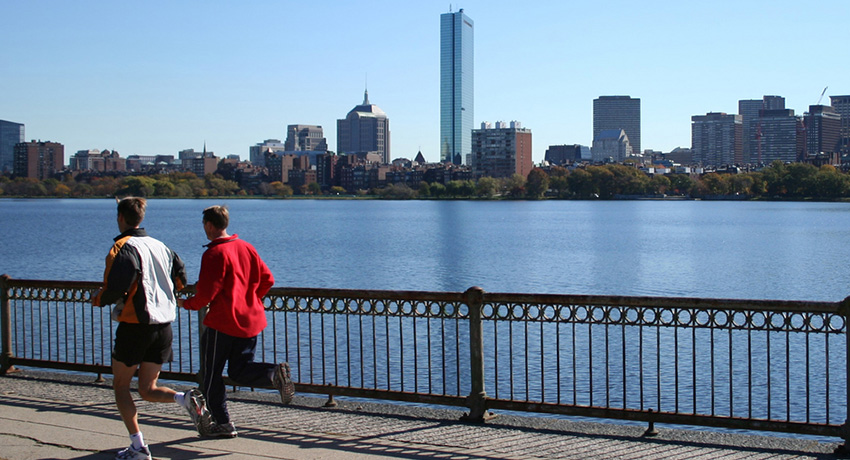How to Heal as a City

Runners along the Charles. Photo via Shutterstock.
Sometimes there are no words, and at this time, we are seeking professional help.
Dr. Steven Schlozman is an assistant professor of psychiatry at Harvard Medical School, staff child psychiatrist at Massachusetts General Hospital, and a parent who lives with his family in Belmont. We all, as residents of the Greater Boston area, have a deep connection to the Boston Marathon, and the signs of stress can be as simple as not sleeping to more complex behaviors like acting out in frustration. We asked Schlozman how we can begin to heal:
Where do we go from here?
Stick to routines as much as possible, and this helps not just kids but all of us. Our anxiety actually gets peaked more when we are thrown off of our routines, especially if they’re surprises. It seems obvious, but it’s really easy to forget. And that can lead itself to almost a kind of almost impulsive, or compulsive, desire to keep checking the news over and over and over to make sure you don’t miss something.
The Marathon is such a big deal to us as residents of Massachusetts, so a lot of people are taking this very personally. How can we start to heal as a city?
Sticking to what you would normally do as a city, all the really cool things that Boston does as a city. You don’t want to try to forget it and move on overnight. I’ve been thinking a lot about this, and I think what would make sense for the city to do, for the citizens to do, would be as best as possible stick to having it be Boston. Don’t let it be only the city that had a bombing. I don’t think that’s how Boston wants to define itself.
One of the things I’ve learned about Boston is it’s a tough, resilient town just as the President said, which I think is all true, but it’s also a town that also seems to be looking for action, for something just shy of a fight. I don’t think that’s going to be helpful at this point, in part because it’s going to make folks act in ways that they might later regret. As much as possible, don’t act with only the primitive side of your brain. You’re going to actively have to check your actions at this point.
What are clinical, medical steps that you start with? Is there a way to start the healing process?
I think what [people] can do is individually is think about what you need. If you need to go be with your family, you should go be with your family. Again with that caveat that you’re not gonna go so far off the routine that your little one says, “Why are you at home when you’re normally at work?” Then they get all freaked out about it. Try to stick to routines. This is actually very clinically oriented, but all this nervous energy lends itself to exercise really well. There’s all sorts of clinical evidence to show that it’s helpful.
What are some steps to healing that people can start today?
The movie I most wanted to watch last night was Anchorman. I wanted a mindless, funny movie. My oldest daughter and I had a good time with it. It’s not like we watched that movie and convinced ourselves that downtown Boston hadn’t had a bomb go off, but it’s not like that movie did any harm, either. I didn’t go watch Zero Dark Thirty. Finding happy, fun diversions, is a really, really big part of being human. That’s why we have books and poetry and movies, and we use them in these circumstances. This is when we should use them.
How can we talk to children about this?
We have studies from places like New York, Madrid, and London. Kids are actually amazingly resilient, and that’s important to remember. Even kids that were there, even kids that were at the finish line, it’s not a sure thing that they’ll be traumatized. They’ll be upset, but when we talk about clinical trauma, PTSD, that’s a pretty rare event, and that’s important to remember. Kids, much more than adults, bounce back really fast. And a lot of that hinges on how the adults around them behave. You don’t want those images on all the time because you don’t want to those little kids to be re-traumatized. Be straightforward you can be with the facts. Just be honest.
Kids, young adults, adolescents, they mirror their parents pretty well. So if the parents are all riled up, they’ll get riled up. If the parents are thinking through it carefully, they’ll think through it carefully. Sit down with them and talk with them about it. Turn off your phone, and look them in the eye. These are things we might actually not think to do. We like to think we do it all the time as parents, but we don’t always do it because we’re doing 40 things at once. This is a time you want to make sure you’ve got your full attention on them so they don’t feel left out, because it is scary for us and it’s scary for them.
And what about adults?
We’re not quite as resilient as kids are with trauma, but we’re really resilient. In that situation, because we’re social creatures, we’re social animals, we’re pack animals, we should look at each other. I had dinner with friends last night and that was just a nice thing to do. We sat around and ate pizza and didn’t directly talk about what had happened, but it was on everybody’s mind. Those kind of moments also make you feel less isolated.

